August 7, 2025
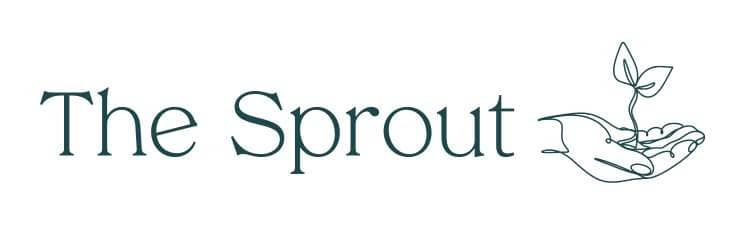
August Greetings!
We hope you are staying cool out there as we head into the second half of the summer season. At a glance we are covering yoga and the brain, sharing new offerings and highlighting our current groups.
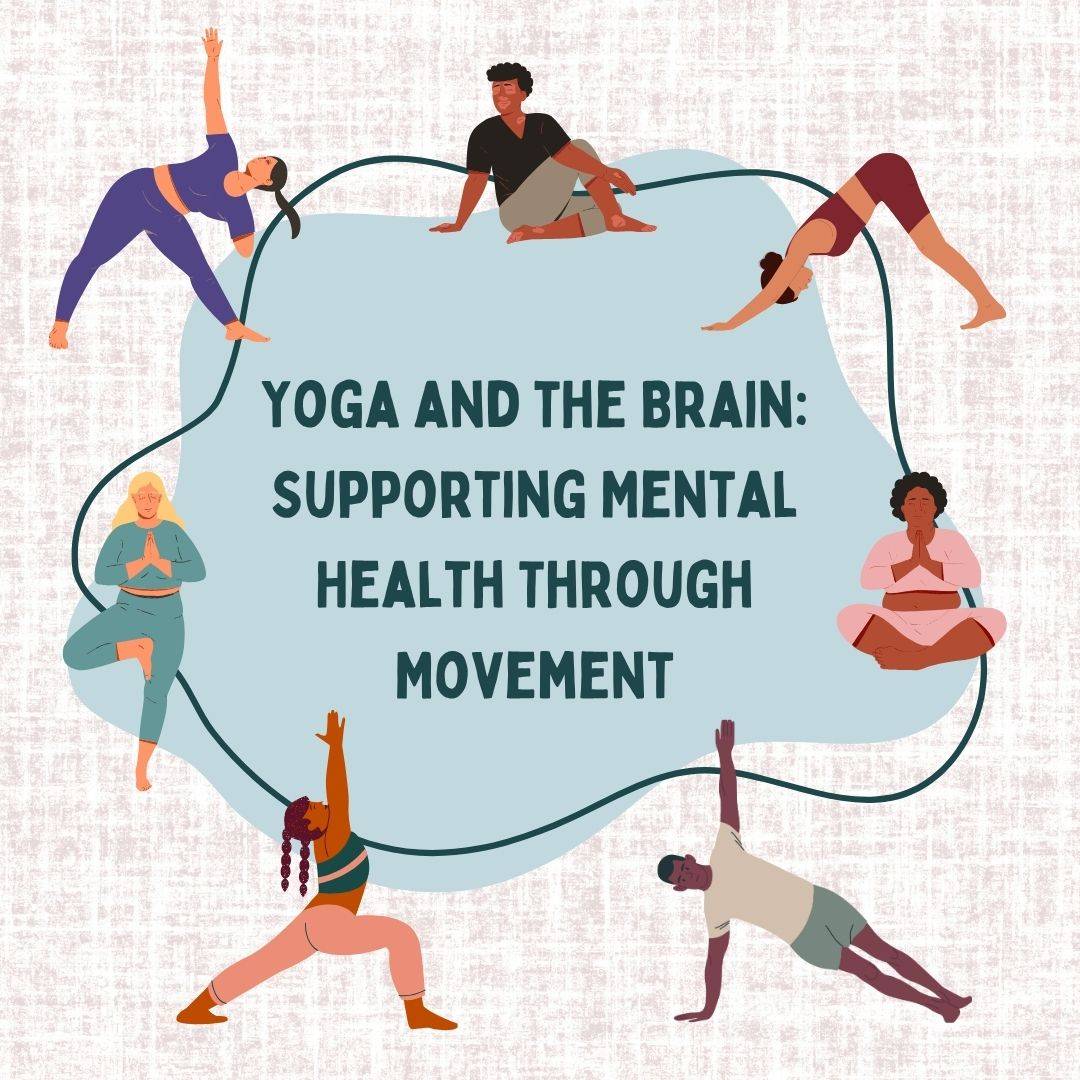
In today’s fast-paced world and hustle culture, where anxiety, depression, trauma, and other mental health concerns are more prevalent than ever, people are seeking effective, accessible ways to support their mental health. Among the variety of wellness practices available, yoga stands out as a powerful tool for emotional, psychological, and physical well-being. Scientific research increasingly supports what ancient yogis have long believed: yoga changes the brain, and by doing so, supports mental health in profound and lasting ways.
The word Yoga, from the Sanskrit root “yuj,” means to yoke, unite, or join, reflecting its aim to unify the mind, body, and spirit. While its physical postures (asanas) strengthen and stretch the body, yoga’s breathing techniques (pranayama) and meditation practices directly engage the brain’s emotional and cognitive centers. Mental health benefits also come from the philosophical framework of yoga. The practice encourages non-attachment (aparigraha), self-study (svadhyaya), and kindness (ahimsa), which align with many goals in therapeutic treatment plans.
This mind-body connection is key to yoga’s mental health benefits. Yoga’s emphasis on awareness and presence can significantly influence mental states. By combining movement with breath and mindfulness, yoga creates conditions that positively impact neurobiology.
A Personal Note
As a millennial dog mom, mental health therapist, and yoga teacher, making space for my personal practice is something I deeply value. Yoga has supported me through trauma, mental health challenges, and the everyday ups and downs of being human. It’s also been a companion during moments of profound joy, deep connection, and celebration. I’ve felt its impact firsthand and have had the privilege of witnessing how it transforms the lives of others. Yoga doesn’t fix everything, but it can be a powerful part of the healing journey. It’s taught me that the practice doesn’t have to be perfect or overly serious. We can wobble, laugh, fall, and try again without judgement. Most importantly, yoga has given me permission to simply be. To show up exactly as I am and explore my relationship with the mind and body with curiosity and compassion.
It’s exciting to be able to share the growing body of evidence and research that continues to validate what so many of us have felt through personal experience; that yoga can be a meaningful, supportive, and transformative practice for both mind and body.
How Yoga Changes the Brain
1. Increases Gray Matter Volume
Neuroimaging studies have shown that regular yoga practice can increase gray matter volume in areas of the brain associated with emotional regulation, attention, and self-awareness. A 2015 study found that yoga practitioners had more gray matter in the hippocampus and prefrontal cortex compared to non-practitioners. The hippocampus and prefrontal cortex are involved in memory, learning, and emotional regulation (Villemure et al., 2015).
2. Reduces Stress Hormones
One of yoga’s most researched benefits is its ability to reduce cortisol, the body’s primary stress hormone. Elevated cortisol is linked to depression, anxiety, and cognitive decline. One systematic review found that yoga significantly reduces cortisol levels in populations with and without clinical conditions (Pascoe & Bauer, 2015).
3. Balances the Nervous System
Yoga activates the parasympathetic nervous system, the body’s “rest and digest” mode, while decreasing sympathetic nervous system activity, responsible for the “fight or flight” response. This shift leads to a calmer baseline, allowing individuals to better manage stress and anxiety over time.
Supporting the Treatment of Depression, Anxiety, and other Mental Health Conditions
Depression affects over 280 million people worldwide (WHO, 2023). Traditional treatments such as talk therapy and medication are effective for many, and may not work for everyone. Yoga offers a complementary, alternative approach.
A study published in the Journal of Alternative and Complementary Medicine found that individuals with major depressive disorder who participated in a 12-week yoga program had significantly reduced symptoms compared to a control group (Uebelacker et al., 2017). The combination of movement, breath control, and mindfulness appeared to help alleviate depressive thoughts and improve mood regulation. Yoga may also help reduce the physical symptoms often associated with mental illness, such as fatigue, restlessness, and chronic pain.
Anxiety disorders are the most common mental health issues globally, affecting 301 million people in 2023 (WHO). Yoga has been shown to reduce both clinical and situational anxiety. One clinical trial published in JAMA Psychiatry in 2020 found that participants with generalized anxiety disorder experienced greater symptom reduction through Kundalini yoga than through a stress education program (Simon et al., 2020).
Trauma disrupts the brain’s ability to regulate itself. For trauma survivors, especially those with PTSD, traditional talk therapy may not be enough. This is where trauma-sensitive yoga has gained attention.
Dr. Bessel van der Kolk, a leading trauma researcher, has extensively studied yoga’s benefits in trauma recovery. His research found that trauma survivors practicing yoga reported a significant decrease in PTSD symptoms and emotional dysregulation (van der Kolk et al., 2014). Yoga helps reconnect individuals to their bodies in a safe, empowering way, facilitating healing from within.
Folks recovering from eating disorders may find Trauma-Informed Yoga to be especially beneficial given its supportive and non-judgmental approach. By emphasizing body awareness, choice, and safety, it helps rebuild a positive relationship with the body, often a central challenge in eating disorder recovery. Practices such as mindful movement, grounding techniques, and breathwork can promote embodiment without triggering shame or control-based thinking (Cook-Cottone et al., 2017; Emerson & Hopper, 2011)
Getting Started: How to Use Yoga to Support Mental Health
Start small – 10–15 minutes a day of gentle stretching and breathing can make a significant impact.
Choose the right style – For mental health, slower forms like Yin or Restorative yoga are often most effective. You can even look for instructors who are trauma-informed and have completed specialized training.
Focus on breath – Incorporating conscious breathing helps regulate the nervous system and increase relaxation. One popular breathing technique is the Box Breath. You can practice the Box Breathing technique by following the instructions below:
- Inhale through the nose for a count of four, Hold for a count of four, Exhale out of the mouth for a count of four, and Hold for a count of four. Continue this cycle for several rounds.
Practice mindfulness – Stay present during (and after) the practice; notice sensations, thoughts, and emotions without judgment.
Yoga is for Every Body and can be a powerful tool for mental wellness. By physically calming the nervous system, increasing beneficial brain matter, and supporting emotional regulation, yoga provides measurable benefits for anxiety, depression, trauma, and our overall mental health.
As science continues to explore yoga’s effects on the brain, one thing becomes increasingly clear: when we move the body, we move the mind too. Incorporating yoga into your routine may be one of the most holistic and empowering steps you can take for your mental health.
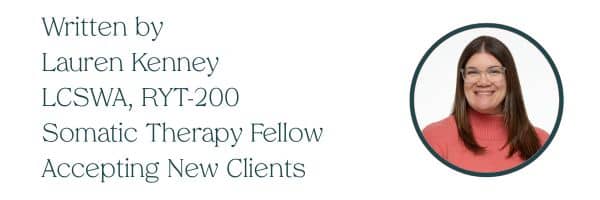
References:
Cook-Cottone, C., Beck, M., & Kane, L. (2017). Manualized mindful yoga: A long-term intervention for eating disorders. International Journal of Eating Disorders, 50(6), 697–701.
Emerson, D., & Hopper, E. (2011). Overcoming trauma through yoga: Reclaiming your body. North Atlantic Books.
Gothe, N. P., Khan, I., Hayes, J., Erlenbach, E., & Damoiseaux, J. S. (2020). Yoga Effects on Brain Health: A Systematic Review of the Current Literature. Brain plasticity, 6(1), 105–122.
Pascoe, M. C., & Bauer, I. E. (2015). A systematic review of randomised control trials on the effects of yoga on stress measures and mood. Psychoneuroendocrinology, 52, 210–218.
Simon, N. M., Hofmann, S. G., Rosenfield, D., et al. (2020). Mindfulness-Based Stress Reduction vs Cognitive Behavioral Therapy vs Kundalini Yoga for Generalized Anxiety Disorder: A Randomized Clinical Trial. JAMA Psychiatry, 77(9), 964–973.
Uebelacker, L. A., et al. (2017). Hatha yoga for depression: Critical review of the evidence for efficacy, plausible mechanisms of action, and directions for future research. Journal of Psychiatric Practice, 23(3), 193–205.
van der Kolk, B. A., et al. (2014). Yoga as an Adjunctive Treatment for Posttraumatic Stress Disorder: A Randomized Controlled Trial. Journal of Clinical Psychiatry, 75(6), e559–e565.
Villemure, C., Ceko, M., Cotton, V. A., & Bushnell, M. C. (2015). Neuroprotective effects of yoga practice: Age-, experience-, and frequency-dependent changes in gray matter volume. Frontiers in Human Neuroscience, 9, 281.
World Health Organization (2023). Anxiety Disorders. https://www.who.int/news-room/fact-sheets/detail/anxiety-disorders
Our Community Partners
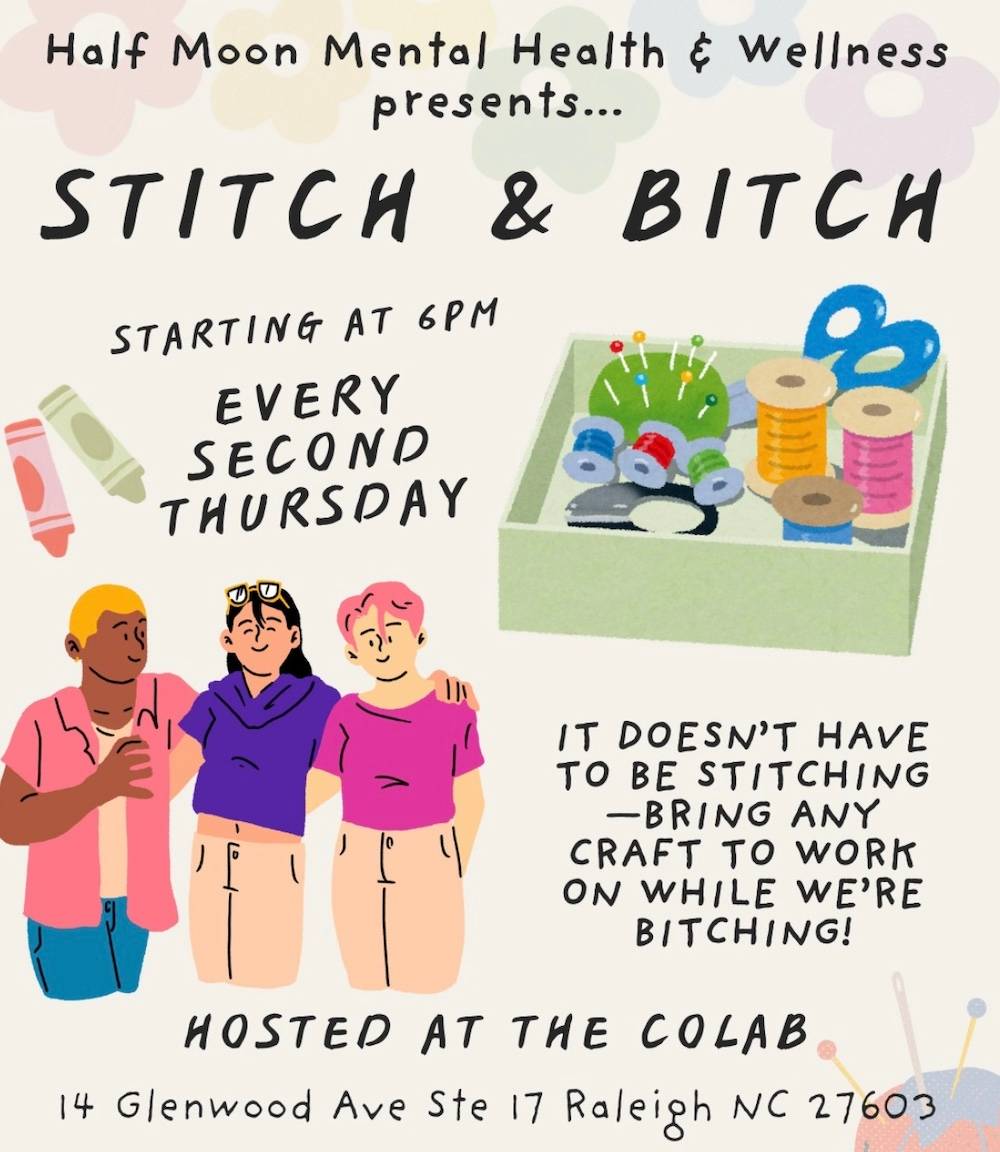
Half Moon Mental Health & Wellness
Whether you’re into knitting, crochet, coloring, or any other craft, come join us for a cozy evening of creativity, conversation, and community. Bring your current project (or start a new one!) and let’s create, laugh and unwind together.
Join Halfmoon hosted at The Colab, on Thursday 8/14 at 6 pm.
14 Glenwood Ave Ste 17, Raleigh, NC 27603
Upcoming Support Groups

Dates: September 18th & 25th and October 2nd & 9th (4 weeks)
Time: Thursdays, 6 – 7:30pm
Location: Virtually on Zoom
Cost: $250
Who: This group is for folks 18+
The workshop will meet once per week for 90 minute sessions and will cover the following:
- Week 1: Why did this happen and where do I go from here?
- Week 2 : Dos and don’ts for food and fitness
- Week 3: Codependency and boundaries: when recovery is and when it isn’t your job
- Week 4: Self-care, self-compassion and getting your own help
Jordan Poole, LCMHC, “JP” (she/ her) will be leading this group. JP is Take Root’s clinical director and has extensive experience as a group therapist and working specifically with families who have a family member with an Eating Disorder. She specializes in the treatment of Eating Disorders and is passionate about supporting and empowering families as they experience such challenges.
Register for Parents & Partners

Dates: September 17th- October 22nd (6 weeks)
Time: Wednesday evenings from 5:30-6:30pm
Location: At our lovely office, 102 New Edition Ct. in Cary, NC
Cost: $40 per session due at the time of session or $200 if you are paying in full, up front. We ask that all participants commit to the full 6 weeks.
Who: This group is for folks 16+
About the Teacher
Lauren Kenney (she,her) is a compassionate and dedicated therapist specializing in helping individuals navigate life’s most challenging moments. As a Licensed Clinical Social Worker Associate, she works with teens and adults (15+) to create a safe, supportive environment where they can explore and heal from struggles such as eating disorders, disordered eating, body image concerns, depression, anxiety, trauma, attachment concerns, and life transitions.
As a Registered Yoga Teacher, I can also incorporate trauma-informed yoga into sessions.Trauma informed yoga is an approach that integrates the principles of trauma sensitivity and mindfulness into the practice of yoga. This practice emphasizes body awareness, grounding techniques, and breathing exercises, allowing individuals to reconnect with their bodies in a gentle and empowering way. When incorporated into therapy, trauma-informed yoga can complement traditional talk therapies, helping clients process trauma, reduce stress, and regulate emotions. The focus is on creating a sense of control, safety, and empowerment, which is essential for healing from past trauma.

Mark your calendar for the Take Root Open House! Come enjoy coffee, delicious breakfast treats, and our make-and-take beaded bracelet station. We look forward to spending the morning with you and sharing our new space!
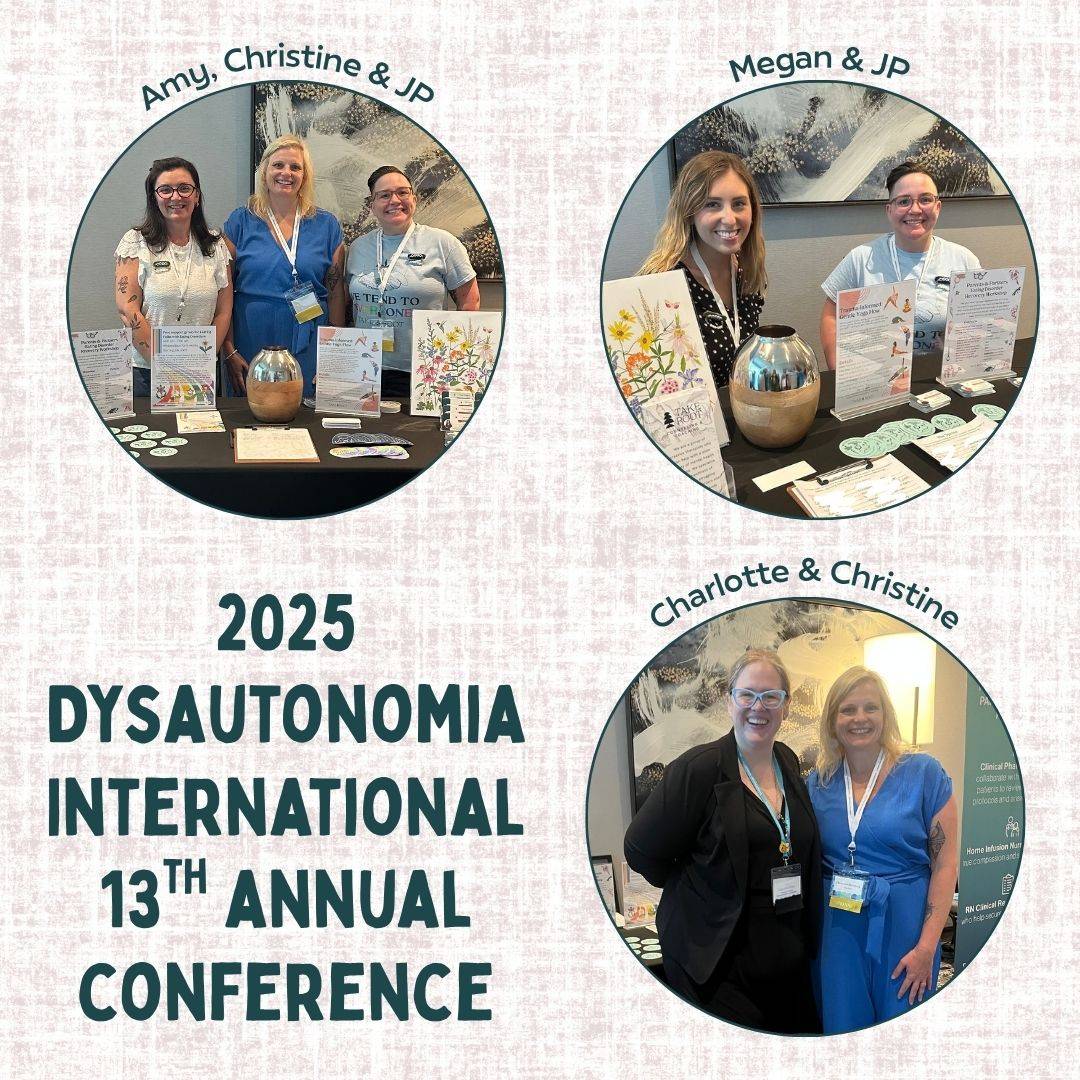
We enjoyed a weekend of connection with folks at the 2025 Dysautonomia International 13th annual conference. People traveled from all over the world to attend the conference and we enjoyed meeting attendees and hearing more about people’s experiences. We learned so much about a community that often struggles with eating disorders and how we can better serve them. Thanks so much to everyone who stopped by to meet us, and special thanks to the event organizers who made this all possible.
If you made it this far, thanks for reading! We look forward to visiting your inbox again soon:) If the info in this email felt helpful, and you know someone who might also think so, please consider passing it along and sharing- we are so grateful for your support.
Kindly,
The Take Root Team

Receive this email from a friend or loved one? If you’d like to read The Sprout monthly, you can sign up HERE.